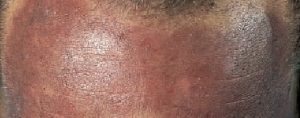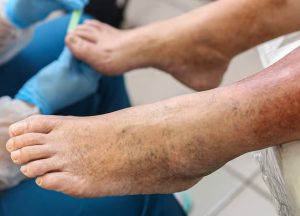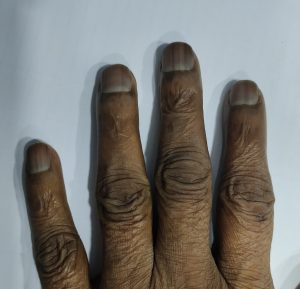
- 2286
- 1
Skin problems in Kidney Disease: Unlocking the Connection
Yesterday one of my dialysis patients, Mrs. Chakraboty asked me “Doctor, why my skin is becoming darker day by day? It was so fair before! What should I apply to make it brighter and healthier again? Should I apply any fairness cream?” Skin problems are very distressing problems and challenging particularly for individuals suffering from kidney failure. Kidney disease affects not only the internal functioning of our body but also has a noticeable external effect on the skin especially for those who are at end-stage renal disorder. In this blog, we will explore the reasons behind skin problems in kidney disease patients, discuss different types of skin problems, and provide insights into when to seek medical help and how to manage these issues.
Can kidney disease causes skin related issues?

The major role of the kidney is to filter waste products and excess fluids from our body. The skin problems are somehow linked to this filtering mechanism. When our kidneys are not functioning properly, toxins can gather in the blood, leading to various skin issues.
What are the factors responsible for skin problems in kidney disease?
Uremia: This is a condition when waste products build up in our blood due to compromised kidney function and cause itching, rashes, blisters, and discoloration.
Fluid Imbalance: Kidneys control our body’s fluid balance. Fluid retention due to impaired kidney functioning can lead to swelling and edema, which ultimately affect our skin’s appearance as well as comfort.
Electrolyte Imbalance: The electrolyte balance in our body is highly maintained by the kidneys. An imbalance of electrolytes leads to skin dryness, itching, and even painful muscle cramps.
What are the common skin problems in kidney disease or kidney failure?
Many of our patients suffering from end-stage renal disorders or ESRD experience a range of skin issues, including:
Pigmentation disorder:
- Anemia, a very common manifestation of chronic kidney disease is one of the major reasons for skin discoloration or pallor in approximately 40% of renal patients.
- Urochrome and carotenoid pigments deposit excessively in the dermal and hypodermal layers of the skin and causes yellowing of the skin in renal patients.
- The increased synthesis of melanocyte-stimulating hormone (MSH) in 20% of dialysis patients stimulates melanin synthesis and thus hyperpigmentation and skin darkening. Interestingly, the MSH concentrations increase with the length of time on dialysis. you can learn more from our videos on skin colour changes.
- Ecchymoses, another kind of skin discoloration are extremely common and are resulted from platelet dysfunction due to elevated urea and creatinine in renal dysfunction patients.

Uremic pruritus:
Itching is one of the most distressing and common complaints that renal patients suffer. It is medically known as pruritus. Several factors are responsible for this problem like uremia, dry skin, phosphate, and parathyroid hormone imbalance. You can have an itch on one area of your skin or it can spread across most of your body.
Rashes:
If you have pruritus for a long time secondary to chronic renal failure, you may also have a 50% chance of developing small, dome-shaped, and extremely itchy bumps medically known as prurigo nodules. As these rashes clear, new ones can develop. Sometimes, the small nodules join together to form rough, raised patches.
 |
Dry skin (Xerosis cutis):The problem of dry skin is more common in those renal patients who have not yet started dialysis. This is caused by a reduction in the size of sweat glands and degeneration of oil-producing glands. Skin becomes rough and scaly, feels tight, cracks easily, and sometimes develops fish-like scales. Dry skin also increases the susceptibility to infections. This is aggravated by delayed wound healing of the skin. |
Half-and-half nails (Lindsay’s nails):Have you noticed a white colour on the lower part of one or more of your nails and a normal to reddish brown colour in the upper part? This may be a symptom of kidney disease. Our nails reveal a lot about our health. White bands may sometimes run across one or more nails. This problem of nails is seen in approximately 20% of the patients with ESRD. The excess production of MSH or edema of the nail bed may be the reason for this problem. |  |
Hyperkeratotic, hyperpigmented papules:
After initiation of dialysis, acquired perforating disorders, typically develops in approximately 2%-11% of dialysis patients. In this skin disorder, one may develop 2-8 mm dome shaped papules with a keratotic plug in the trunk buttocks, and proximal extremities. These papules may merge into plaques with a linear pattern and can be accompanied by intense pruritus.
Bullous Diseases and Blisters:
This may occur in kidney failure patients due to the accumulation of photosensitive molecules in the skin that, on ultraviolet light exposure leads to fragility of skin and blisters on sun-exposed areas.
Calcium deposit under the skin:
Calcium deposits in the skin of some people suffering from renal disorder. This deposition usually develops around a joint and is not usually painful. However, when they occur within a fingertip, they are often very painful. Metabolic disorders of calcium and phosphate, parathyroid regulation, systemic inflammation, oxidative stress, and endothelial injury are the causes of this problem.
Is there any link between the skin problems and progression of kidney disease?
Skin issues may be subtle in the early stages of kidney disease, including dryness, itching, and mild discoloration. As kidney function deteriorates, skin problems can become more severe, with symptoms like severe itching, hyperpigmentation, and edema.
How can you manage skin problems in kidney disease?
- Hydration: Proper hydration by drinking adequate water can improve your dry skin unless restricted by our healthcare provider. You can also hear podcast to learn more about fluid restrictions for CKD.
- Dialysis: For end-stage renal disease, dialysis can help to eliminate waste products and excess fluid from our body, thus improving skin symptoms.
- Phosphate Binders can help you to control phosphate levels and reduce itching.
- Topical Treatments such as Emollients and moisturizers can relieve dry skin.
- Erythropoietin treatment and anemia correction may improve pallor condition.
- Daily sunscreen use can improve the problem of skin darkening in addition to sun protection.
- Avoiding alcohol, hepatotoxic medications, and sun exposure, can also be effective for treating Bullous diseases and blisters.
- Renal transplantation can reduce the melanocyte synthesis to normal. Thus help to regain the skin’s normal brightness within a few days of transplantation.
When to consult a doctor?
If you are a kidney disease patient experiencing skin problems symptoms, it is essential to consult your healthcare provider on time, especially when
- Your skin problems are severe or worsening.
- The itching becomes unbearable.
- You notice skin changes like darkening or unusual rashes.
In conclusion, the journey of a person suffering from chronic kidney disease to kidney failure stages is undoubtedly difficult, with numerous physical and emotional obstacles to overcome. We have discussed the effect of kidney disease and kidney failure on the skin in this blog which is a critical factor that is often overlooked but deserving more attention. It’s important to remember that awareness and timely intervention can make a world of difference. We may endeavor to enhance the quality of life for patients bravely battling end-stage renal disease through medical innovations, compassionate treatment, and a better comprehension of these skin disorders. By shedding light on these challenges, we take a step closer to a brighter, healthier future for all.
Comment
Check Your EGFR
***We Promise, no spam!








2023-09-19 13:57:49
Awesome...awesome information..all these things I faced last three yrs.....now I have transplanted kidney.....now I am free from these ....
Thank You and best wishes?